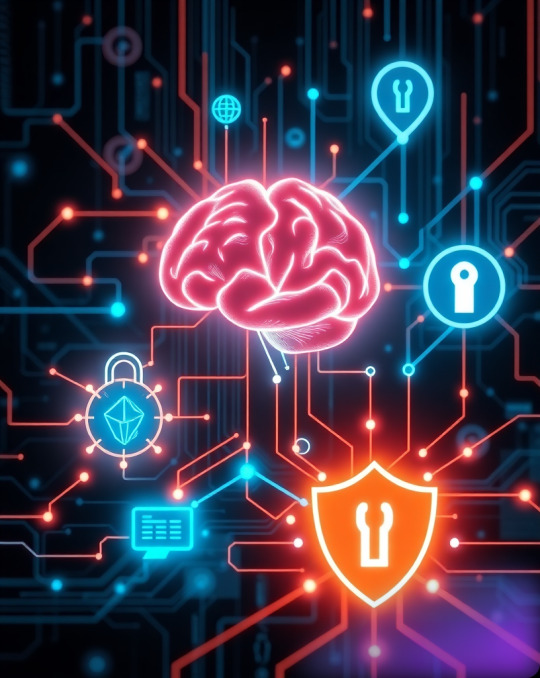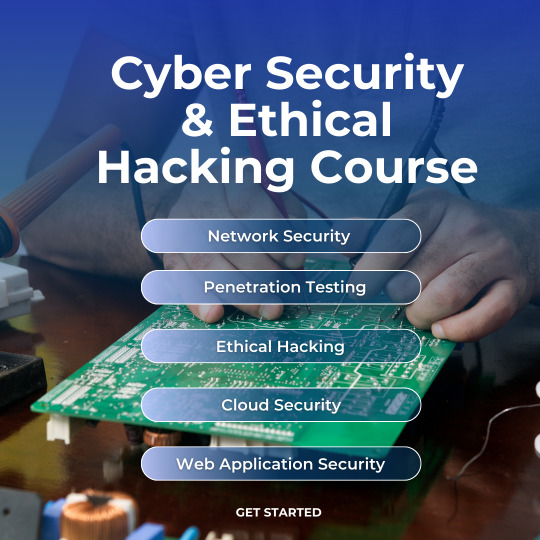#learn ethical hacking
Explore tagged Tumblr posts
Text

Six months of ethical hacking training in the areas of cybersecurity basics, vulnerabilities of network and systems, wireless and web security, and preparation for CEH exams using lab sessions and actual techniques.
#Ethical Hacking#Ethical Hacking Course#Learn Ethical Hacking#Ethical Hacking Training#Ethical Hacking Certification
1 note
·
View note
Text
Strengthening Cyber Resilience in Supply Chains: Preparing for Future Attacks

In today’s interconnected world, supply chains are a crucial part of business operations. However, with this connectivity comes increased vulnerability to cyber threats. Organizations must proactively develop cyber resilience strategies to protect against attacks, maintain business continuity, and adapt to evolving cyber risks.
What is Cyber Resilience in Supply Chains?
Cyber resilience is an organization's ability to anticipate, withstand, recover from, and adapt to cyber threats. Unlike cybersecurity, which primarily focuses on prevention, cyber resilience ensures that operations can continue even in the face of an attack. Given the complexity of supply chains—with multiple vendors, digital systems, and geographical reach—adopting a cyber-resilient approach is vital.
The Rising Threats to Supply Chains
Supply chains are attractive targets for cybercriminals due to their vast networks and reliance on third-party vendors. Some of the biggest cyber risks include:
Ransomware Attacks – Hackers encrypt crucial supply chain data and demand a ransom for its release.
Phishing & Social Engineering – Cybercriminals use deceptive emails or messages to trick employees into revealing sensitive information.
Malware Infiltration – Malicious software can spread across supply chain networks, causing disruptions.
Third-Party Vulnerabilities – Weak security measures by vendors can expose the entire supply chain to cyber threats.
Data Breaches – Attackers exploit security loopholes to access and steal confidential business or customer information.
To mitigate these risks, organizations must establish strong cyber resilience strategies.
Essential Cyber Resilience Strategies for Supply Chains
1. Conduct Thorough Risk Assessments
A proactive stance on cyber resilience starts with a comprehensive risk assessment. This involves:
Identifying critical assets and their dependencies.
Evaluating vulnerabilities across the supply chain ecosystem.
Assessing third-party security risks.
Developing targeted risk mitigation measures.
2. Adopt a Zero Trust Security Model
The Zero Trust approach ensures that no system, user, or device is automatically trusted. It includes:
Rigorous authentication for all users and devices.
Implementing least privilege access, ensuring users only access necessary data.
Using network segmentation to contain potential breaches.
3. Strengthen Third-Party Security Controls
Since third-party vendors can be a weak link, organizations must:
Set clear security expectations in vendor agreements.
Regularly audit and assess supplier security postures.
Enforce robust authentication and encryption standards.
4. Enhance Endpoint and Network Protection
Strong security measures must be implemented across all devices and networks, such as:
Deploying firewalls and intrusion detection/prevention systems.
Utilizing endpoint detection and response (EDR) tools.
Encrypting sensitive data to prevent unauthorized access.
5. Promote a Culture of Cybersecurity Awareness
Employees play a crucial role in cyber resilience. Organizations should:
Conduct regular training on phishing detection and cybersecurity best practices.
Simulate cyber incidents to improve response readiness.
Foster a culture where security is a shared responsibility across the supply chain.
6. Develop and Test an Incident Response Plan
Having a solid incident response plan (IRP) is essential for minimizing damage in case of an attack. This involves:
Clearly defining roles and responsibilities for cyber incident management.
Creating protocols for quick containment and recovery.
Running simulated attack scenarios to ensure the IRP remains effective.
7. Utilize Threat Intelligence and Continuous Monitoring
Staying ahead of cyber threats requires ongoing vigilance. Organizations should:
Subscribe to threat intelligence feeds for real-time insights.
Implement Security Information and Event Management (SIEM) tools.
Continuously monitor networks for anomalies and suspicious activities.
8. Invest in Cyber Security Professional Courses
Building cyber resilience requires skilled professionals who understand the latest threats and best practices. A great way to enhance cybersecurity expertise is through structured training programs like the Boston Institute of Analytics' Cyber Security Certificate Program in Thane. This program offers hands-on learning in:
Cyber threat analysis and response strategies.
Digital forensics and incident handling.
Ethical hacking and network security.
Compliance regulations and risk management.
Enrolling in such programs helps supply chain professionals strengthen their cybersecurity skills, contributing to a more secure and resilient business environment.
Final Thoughts
Cyber resilience is no longer just an option—it’s a necessity for modern supply chains. As cyber threats continue to evolve, organizations must adopt a proactive approach by enforcing strict vendor security measures, implementing advanced security frameworks like Zero Trust, and fostering a culture of cybersecurity awareness. By leveraging continuous monitoring, threat intelligence, and expert training programs, businesses can build a robust cyber resilience strategy and prepare for the next wave of cyberattacks.
#Learn Ethical Hacking#Cyber security Professional Courses#Cyber Security Course#Cyber Security Certificate Program in Thane
0 notes
Text

The Evolution of Hacking: From Cyberpunk Fantasy to Real-World Reality
Hacking has been a part of internet culture for as long as there’s been an internet to hack. For some, it’s a rebellious act—tearing down the walls built by corporations or governments. For others, it’s an artform, a way of playing with systems, seeing how far you can push boundaries. But what does hacking really mean today? And why does it still capture our imagination?
Historically, hacking has been portrayed as a dark art. Think back to movies like The Matrix or Hackers—hackers as antiheroes, taking down the system from the inside. But while these portrayals are often exaggerated, they did reflect a truth: hacking represents a desire to reclaim power and control. In a world where tech companies and governments collect personal data and monitor our every move, hacking is one way to level the playing field.
In the real world, hacking has taken on many forms. There’s ethical hacking, where people are hired to test systems for vulnerabilities, and there’s black-hat hacking, which involves illegal activities. But even those who engage in illegal hacking often see themselves as part of a larger rebellion against control and surveillance.
It’s easy to romanticize hacking, to see it as this cool, underground world of rebellious acts and revolutionary potential. But the reality is more complex. Hacking today isn’t just about taking down the man; it’s about finding flaws, building something new, or even just learning how things work beneath the surface. It’s about pushing boundaries, challenging authority, and questioning the systems that run our world.
And perhaps that’s the real reason hacking still resonates with so many people. It’s not just a skill or a rebellion—it’s a form of empowerment. It’s the ability to break free from the constraints placed on us, even if only for a moment.
In a world where everything feels so rigid, so controlled, hacking is the ultimate act of freedom. It’s a reminder that the digital world is malleable, that we can create our own paths through it, and that the rules are often made to be broken.
#hacking#ethical hacking#wifi hacking#password hacking#hacking techniques#hacking tools#atm hacking#hacking guide#hacking skills#hacking device#israel hacking#hacking mindset#israeli hacking#hacking tutorial#wireless hacking#black hat hacking#whatsapp hacking#python for hacking#hacking windows 11#how to learn hacking#government hacking#wifi password hacking#beginner hacking guide#why russians are hacking#state sponsored hacking
8 notes
·
View notes
Text
The Hacker's Guidebook:
Aspiring hackers! I’ve created a guide covering core cybersecurity concepts new hackers should master before tools. I break down networking, OS internals, & hacking tactics. Recognize hacking as lifelong journey—arm yourself with the basics!
Core Concepts for Budding Cybersecurity Enthusiasts The Building Blocks of Ethical Hacking So you want to become an ethical hacker and enter the exciting world of cybersecurity. That’s awesome! However, before you dive headfirst into firing up Kali Linux and hacking everything in sight, it’s vital to build up your foundational knowledge across several InfoSec domains. Mastering the fundamentals…

View On WordPress
#attacking tools#basics of hacking#cross site scripting#Cyber Threat Defense#cybersec#cybersecurity learning#cybersecurity professional#Ethical Hacking#fundamentals#hacking basics#hacking for beginners#hacking guide#hacking networks#hacking web#how to hack#infosec#learn hacking#learn to hack#linux#malware basics#malware for hacking#metasploit#netsec#network hacking#nmap#operating systems#Pentesting#phishing#phishing attacks#Red Team
34 notes
·
View notes
Text
Curie would love the followers of the apocalypse girlie needs to find a way to contact them immediately.
#she is trying so hard doing what folkowers doesnin west but just by herself alone in east coast#she would love sharing her 200 years of archived knowledge in her brain#also when she is synth followers would like to do some research (completely ethical amd with her consent)#like how they try to hack mr house to learn how he lives that long they would use synth biology knowledge to improve human lifes#curie herself would love it#she would also love learning about new knowledge like post war history or species that doesn't exist in east like nightkin etc.#geym#fallout 4#curie
5 notes
·
View notes
Text

Get expert-led ethical hacking training in Jaipur with Cyber Crime Awareness Society. Master ethical hacking techniques, cyber laws, and penetration testing with practical sessions and real-time case studies. Build a strong foundation in cybersecurity and boost your career prospects. Perfect for students and professionals. Limited slots available! Call now at +91 97842 68547 to register and learn more.
0 notes
Text

#Trending Tech Skills 2025#Artificial Intelligence & Machine Learning#Cloud Computing & DevOps#Cybersecurity & Ethical Hacking#Blockchain & Web3#technology
0 notes
Text
The Best Online Platforms for Learning Ethical Hacking (Legally Becoming the Sherlock Holmes of Cybersecurity)
Want to learn how to hack… for good? Ethical hacking is your ticket to being the cool cyber-whiz that saves the day rather than causes chaos. If the idea of spotting security weaknesses and preventing breaches makes you feel like a digital superhero, you’re in the right place. But before you go all Mr. Robot, you need to get some serious training under your belt. The good news? There are tons of…
#best hacking courses#cybersecurity certifications#ethical hacking for beginners#ethical hacking platforms#learn ethical hacking online
0 notes
Text
Ethical hacking implies identifying vulnerabilities in systems and networks to help organizations strengthen their security measures. By choosing to learn ethical hacking in Delhi, you can leverage the city’s advanced educational facilities and exposure to leading industry experts.
0 notes
Text
Mastering Cybersecurity with Tabletop Exercises (TTX): A Comprehensive Guide

Cyber threats are constantly evolving, and organizations must stay prepared to handle potential security incidents. One of the most effective ways to strengthen an organization’s cybersecurity strategy is through Tabletop Exercises (TTX). These exercises are discussion-based simulations that help teams analyze and refine their response to cybersecurity threats in a structured setting.
A Tabletop Exercise (TTX) helps organizations test their cybersecurity response plan, uncover weaknesses, and improve coordination among stakeholders. It is a proactive way to ensure that security teams and decision-makers can efficiently respond to cyber incidents.
Why Are Tabletop Exercises Important?
Tabletop Exercises serve several critical functions in an organization’s cybersecurity preparedness:
Strengthening Incident Response – Teams gain a better understanding of their roles and responsibilities in the event of a security breach.
Assessing Security Protocols – The exercise helps evaluate how effective current security measures and policies are.
Boosting Team Coordination – Cross-functional teams, including IT, legal, and executive leadership, work together to enhance cybersecurity awareness.
Identifying Security Gaps – TTX exposes vulnerabilities in an organization’s defences and response plans.
Meeting Compliance Requirements – Many industries require businesses to conduct TTX as part of cybersecurity compliance.
How a Cybersecurity Tabletop Exercise Works
A TTX session follows a well-structured approach to maximize effectiveness:
1. Planning the Exercise
Defining the Goals – Organizations determine what they aim to achieve with the exercise, such as testing responses to ransomware attacks or phishing schemes.
Selecting Participants – IT security teams, compliance officers, legal advisors, and senior executives take part in the session.
Creating a Realistic Scenario – A credible cyber threat scenario is developed to test incident response strategies.
Setting Boundaries – A defined scope ensures discussions remain focused and productive.
2. Running the Exercise
Presenting the Scenario – Facilitators introduce the cyber attack scenario, outlining key details.
Team Discussions – Participants analyze the threat and discuss how to handle the situation.
Adding Challenges – Additional complications, such as regulatory involvement or media exposure, test the team’s ability to adapt.
3. Reviewing and Improving
Identifying Strengths & Weaknesses – The team assesses what worked and what needs improvement.
Providing Recommendations – Adjustments to cybersecurity policies and incident response procedures are proposed.
Implementing Changes – Organizations take corrective actions to enhance their overall security posture.
Different Types of Tabletop Exercises
Organizations can customize TTX sessions based on their specific cybersecurity goals:
Technical TTX – Designed for IT security professionals to test their technical response to cyber threats like malware and ransomware attacks.
Operational TTX – Involves multiple departments, including PR and legal teams, to assess organizational responses beyond just IT security.
Compliance-Focused TTX – Helps ensure adherence to frameworks like ISO 27001, NIST, PCI DSS, HIPAA, and GDPR.
Executive-Level TTX – Tailored for senior leaders to evaluate their decision-making in a high-pressure cyber crisis.
Advantages of Regular Tabletop Exercises
Conducting Tabletop Exercises (TTX) on a regular basis benefits organizations in multiple ways:
Enhancing Cyber Readiness – Organizations become better equipped to detect and mitigate cyber threats.
Reducing Response Time – Teams develop faster and more efficient incident response capabilities.
Strengthening Security Culture – Employees at all levels develop a proactive approach to cybersecurity.
Achieving Regulatory Compliance – Helps businesses meet industry security standards.
Minimizing Business Disruption – Ensures a rapid response to minimize the financial and reputational impact of cyber incidents.
Upskilling in Cybersecurity: The Boston Institute of Analytics' Cyber Security Certificate Program in Thane
As cyber threats become more sophisticated, it is crucial for professionals to build expertise in Tabletop Exercises (TTX) and other cybersecurity disciplines. The Boston Institute of Analytics (BIA) offers a Cyber Security Certificate Program in Thane, providing in-depth knowledge and practical skills to combat cyber threats.
Key Features of the Program:
Comprehensive Training – Covers ethical hacking, penetration testing, risk management, cloud security, and incident response.
Hands-On Learning – Includes real-world cyber attack simulations and Tabletop Exercise (TTX) practice.
Expert Faculty – Learn from industry professionals with real-world cybersecurity experience.
Industry-Recognized Certification – Gain a competitive edge in the job market.
Flexible Study Modes – Classroom and online options are available for students and working professionals.
Final Thoughts
Tabletop Exercises (TTX) are a vital component of cybersecurity resilience, enabling organizations to anticipate threats and refine their response strategies. By regularly conducting TTX sessions, businesses can strengthen their security posture and reduce the risks associated with cyber incidents.
For professionals looking to advance their cybersecurity careers, investing in quality training such as the Boston Institute of Analytics' Cyber Security Certificate Program in Thane provides the necessary skills to tackle cyber challenges effectively.
By prioritizing both TTX and ongoing education, organizations and professionals alike can contribute to a safer digital landscape.
#Cyber Security Course#Learn Ethical Hacking#Cyber Security Certificate Program in Thane#Cyber security Professional Courses#Ethical Hacking Course
0 notes
Text
Staying Relevant: Balancing Learning and Life as an Ethical Hacker
Have you experienced burnout while trying to develop your skills and you just don't have the time to do everything? Finding balance is the key to improving your skills in a healthy way. In this article, I explore healthy habits to grow without burning out
You’ve heard it before – cybersecurity is a field that evolves at a blindingly fast pace. The tools, techniques, and technologies threatening networks transform rapidly. As an ethical hacker, your skills can become obsolete within months if you aren’t continuously upgrading your knowledge. Point #4 on our hacker roadmap deals with knowing the latest and greatest when it comes to the state of…

View On WordPress
#burnout#certifications#conference#continuous learning#Cyber Security#cybersecurity education#cybersecurity skills#Ethical Hacking#hacker skills#infosec community#leadership#learning plan#maintaining balance#microlearning#Penetration Testing#pentesting methodologies#personal development#podcast#red team operations#security news#security policies#security tools#time management#trends#vulnerability assessments#work-life balance
3 notes
·
View notes
Text
0 notes
Text
How to Install Kali Linux in VMware in Just 4 Simple Steps (Easiest Way)
In this guide, you will be able to learn the easiest way of how to install Kali Linux on VMware in Just 4 Simple Steps, I hope this helps a lot!
To keep in mind: Obtaining unauthorized access to another’s computer system or systems is illegal under the Computer Fraud & Abuse Act. Here you will find a step by step guide on how to install Kali Linux onto VMware. The main purpose of this blog tutorial is to educate others on cyber security tools, technologies, and techniques with the intention of creating consciousness for others on better…

View On WordPress
#best cybersecurity tools#Cybersecurity#cybersecurity course#cybersecurity jobs#ethical hacking#How to#how to code#how to install#how to install kali linux#how to install vmware#how to learn cybersecurity#how to learn linux#how to use a virtual machine#Kali Linux#linux#linux jobs#virtual machine#VMware
0 notes
Text
Cloud Computing in Zenixus
#zenixus#python#machine learning#coding#programming#bestsoftwaretrainingcentre#softwaretraining#artificial intelligence#zenixuselearning#html#cloud computing#netwoking#ethical hacking
0 notes
Video
youtube
Ethical Hacking in 15 Hours - 2023 Edition - Learn to Hack! (Part 1)
0 notes